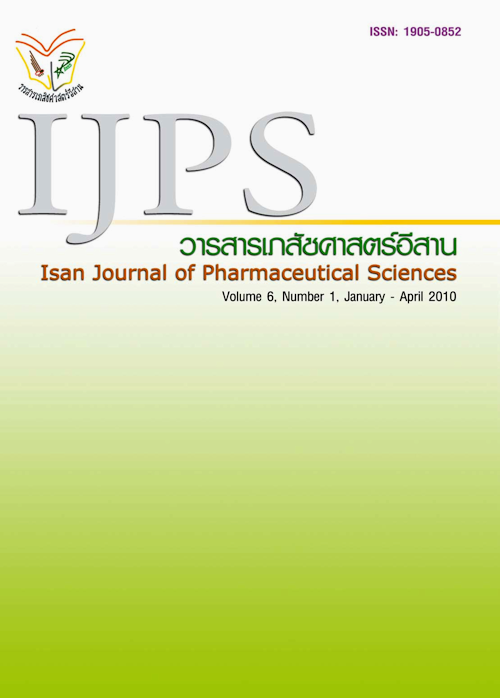Project Evaluation of Recruiting Pharmacy Descendant to Study in Faculty of Pharmacy
Main Article Content
Abstract
Legally, pharmacist is required to be on duty all the time of service. In Thailand, despite a number of
government agendas have been issued, there are still a problem of actual working phamacist in
a phamacy shop. In 2006, the Food and Drug Administration, Ministry of Public Health has implemented
a project entitled ùRecruiting pharmacy descendant to study in faculty of pharmacyû. This project was
a special tract to recruit pharmacy descendant into pharmacy degree course in universities. The student
and the pharmacy owner had to sign a contract committing that student had to come to work in a
pharmacy after graduation. This was a new project which should be evaluated. The evaluation was
conducted by CIPP model (Context › Input › Process › Product Model). Data was collected by
interviewing 7 relevant administers in Faculty of pharmacies, 10 committee members of Drug store club
(Thailand), together with document searching and sending questionnaires sent to projectûs students. The
evaluation was performed during November 2008 › June 2009, four years after the initiation of the
project, Context evaluation revealed that the project was launched on the hypothesis that signing contract
to commit students to work in the parentûs shop would be effective. It was also found that the university
could run the project without interfering with the normal student admission into university. For input
evaluation; the project involved several parties which all of them were happy and got benefit from the
project. The criteria of recruiting students into the project were a little bit different between universities, but
they did not affect the goal of the project. Process evaluation revealed that all universities used admission
paper examination and/or admission interview to recruit the students. But the competition was within
group of pharmacy descendant only. The projectûs students were put into the same class as regular
pharmacy students. Product evaluation showed no difference in learning achievement between the
projectûs students and regular students. However, the actual number of students was far below the aimed
figure of the project. This under targeted number was important as it may reflect to the failure of the
projectûs goal. Having performed this interim project evaluation, a few suggestions were made i.e. only
pharmacy descendant should be eligible to the project, right attitude and correct understanding to the projectûs goal should be emphasized to the public and special course to prepare students to be community
pharmacist should be considered.
Article Details
In the case that some parts are used by others The author must Confirm that obtaining permission to use some of the original authors. And must attach evidence That the permission has been included
References
Denzin NK., Lincoln YS. The SAGE Handbook of Qualitative Research, 3rd ed. Thousand Oaks, CA: SAGE Publications; 2005.
Stufflebeam DL., Shinkfield AJ., Evaluation theory: Models & applications. San Francisco, Willey Imprint; 2007.


